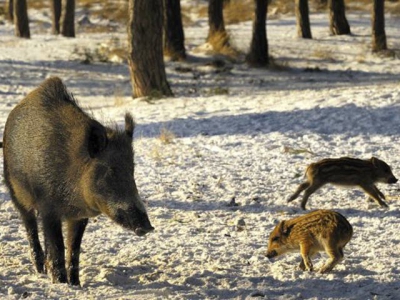African swine fever vaccine for wild boars in works

Study shows wild boars inoculated in lab produced antibodies against ASF virus and could pass on immunity via contact.
Wild boars can be immunized against African swine fever (ASF) through a new vaccine delivered in the animals' food, according to new research published in Frontiers in Veterinary Science.
This is the first report of a promising inoculation against this deadly disease, which is a worldwide threat to the swine industry. The study also provides evidence that this immunity can be passed on via contact with immunized individuals, but further studies are needed to examine exactly how this occurs as well as the safety of repeated administration.
"African swine fever is of enormous concern to the pig industry," said Dr. Jose Angel Barasona, a researcher at the VISAVET Health Surveillance Centre and co-author of this research. "Our study demonstrates the effectiveness of the first oral vaccine against this disease on Eurasian wild boar. Overall, we demonstrate that oral immunization of wild boar conferred 92% protection against a highly pathogenic strain of African swine fever, which is currently circulating in Asia and Europe."
Infected animals can suffer terribly, according to Frontiers. Symptoms include high fever, depression, loss of appetite, vomiting, diarrhea, abortion in pregnant sows and redness of the skin on the ears, abdomen and legs. The most virulent, or dangerous, forms of this virus can lead to the death of all swine infected.
ASF affects more than 55 countries on three continents, including China, which contains nearly half of the world's pig population. It is highly contagious and can be spread via contaminated feed and pork products as well as shoes, clothes, vehicles, knives and equipment. Transmission can also occur by movement of infected livestock and across wild boar populations. It is this latter form of ASF infection that Barasona and his colleagues hope to prevent.
"Wild boar is the most severely affected by this virus in Europe, and to date, none of the control measures have been effective," he said. "The importance of vaccinating wild boar was demonstrated during the 2000s, when classical swine fever affected different European countries and an oral vaccine was used to reduce the incidence of infection in the wild populations in Germany."
The complex nature of the ASF virus, gaps in knowledge concerning infection and immunity and technical difficulties have hindered vaccine development, but in 2017, a wild boar in Latvia provided a breakthrough.
"Serum from a wild boar hunted in Rietumpieriga, Latvia, was confirmed as African swine fever virus positive at the [European Union] reference laboratory in Madrid, Spain," Barasona reported. "This was a weakly virulent strain of the disease, which enabled us to produce a live vaccine. When we inoculated wild boar in our laboratories with this live strain, they showed no symptoms of this disease but produced antibodies against the virus, ultimately giving them protection against the more dangerous form."
Immunity can be passed on via contact
When tested, as well as proving the vaccine's effectiveness against one of the most dangerous strains of ASF, the study revealed an additional capability to immunize other wild boars through contact with orally vaccinated animals.
"The 'shedding' of this vaccine might help amplify vaccination coverage, reducing the need for expensive production and large-scale administration of vaccine in the field," Barasona explained.
This vaccine, which would be administered in bait to the wild animals, represents considerable progress in the control of ASF in the wild and, subsequently, at the domestic/wildlife interface. However, Barasona cautioned that more research is needed before it can be used widely.
"If the safety of the vaccine can be established, then it may help mitigate the uncontrolled spread of African swine fever across Europe and Asia, like the success so far in halting the spread of classical swine fever," he said. "Future studies should examine the vaccine's safety following repeated administration, the process of 'shedding' and its genetic stability during passage from one animal to another."
Có thể bạn quan tâm
 Pigs may transmit FMD before showing symptoms
Pigs may transmit FMD before showing symptoms Pigs infected with FMD virus were highly contagious to other pigs just 24 hours after infection.
 Camelina cover-crop use may support pig growth, soil health
Camelina cover-crop use may support pig growth, soil health Camelina may provide a partial alternative to soybean meal use in swine diets at low levels while promoting soil health as a winter cover crop, says researcher.
 Third case of PED in Alberta false positive
Third case of PED in Alberta false positive False positives are infrequent but can be expected occasionally in disease investigations, due to the sensitivity and concern for positive results.